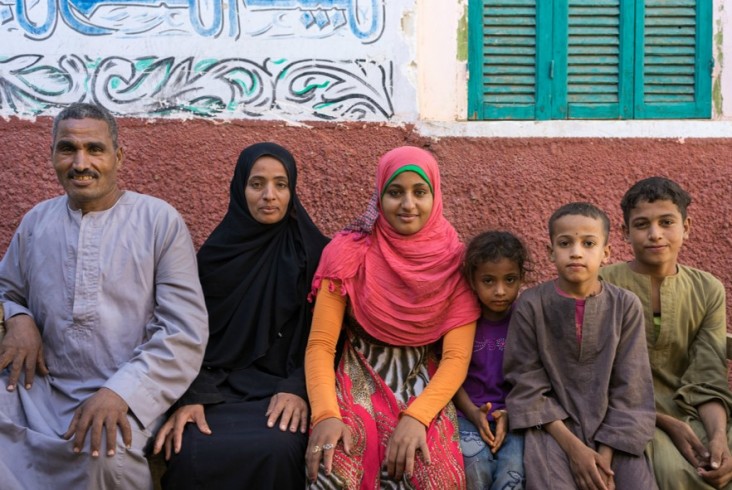
Overview
USAID works in partnership with the Government of Egypt to reduce gender gaps across a wide range of sectors and activities, including removing constraints to women’s economic participation; addressing sexual harassment and gender-based violence; and reducing the gender enrollment gap at all levels of education – including improving access for girls to Science, Technology, Engineering, and Mathematics (STEM) education.
Egypt ranks low in gender equity compared to other countries worldwide. The 2015 Global Gender Gap Index, which measures disparities between men and women across countries, ranks Egypt at 136 out of 145 countries worldwide. Women have significantly lower participation in the labor force than men (26% vs 79%) and lower literacy (65% literacy for women vs 82% of males). The Organization for Economic Cooperation and Development’s Social Institutions and Gender Index 2014, which measures legislation, practices, and attitudes that restrict women’s rights and opportunities, classifies Egypt to be among the countries ‘very high’ in gender discrimination together with others in Africa and the Middle East. And as revealed by the 2014 Demographic and Health Survey, 92% of the ever-married women ages 15-49 interviewed have been circumcised.
Empowering women and integrating them as active participants in the economy is essential to promoting economic growth in Egypt. According to the IMF, raising the female labor force participation rate to the male level, coupled with access to employment opportunities, would increase GDP by approximately 34 percent. In partnership with the Government of Egypt and the private sector, USAID has a number of activities designed to improve the skills and participation rate of women in the workforce and remove constraints to women’s economic participation in micro, small, and medium enterprises.
For instance, one component of USAID’s Strengthening Entrepreneurship and Enterprise Development (SEED) project is to provide business development services to help women launch new businesses – and create new jobs. The Workforce Improvement and Skills Enhancement (WISE) project focuses on skills development through providing teacher training in technical schools, on-the-job training, and employability training for job seekers – with a focus on women and youth. To promote workplace safety and help narrow the gender employment gap in agribusiness, USAID’s Women’s Employment Promotion program focuses on reducing sexual harassment in the agribusiness industry. To encourage women’s participation in areas important to Egypt’s economy, USAID has provided over 600 scholarships since 2014 to female undergraduate and graduate students to study in fields such as business, science, and engineering.
Recognizing the importance of education in empowering girls and women socially, economically, and politically, USAID works in partnership with the Government of Egypt to encourage equitable access to quality education and ensure impactful learning outcomes starting at the primary level. In secondary education, USAID supports girls’ participation in science, technology, engineering, and mathematics high schools in multiple governorates in Egypt. To improve quality of teaching and learning, USAID has provided equal opportunities for training and professional development to both male and female teachers in public schools. Through the U.S.-Egypt Higher Education Initiative, USAID awarded scholarships to women to pursue master’s in business administration degrees and STEM undergraduate degrees at U.S. universities.
USAID health activities implement and expand on a set of proven interventions focused on improving health behaviors and enhancing the quality of health services while adopting a woman- and girl-centered approach. Activities to address maternal, neonatal, and child health and nutrition have adopted an equity-focused approach by targeting the most vulnerable women and newborns, improving the continuum of care, building the capacity of health care providers, strengthening health systems, promoting communication for behavioral changes, and creating an enabling environment for maternal and newborn health and gender equality.
Gender-related dynamics and constraints are addressed with both health service providers and with the communities and families they serve. Community Health Workers (CHWs) are trained to communicate health messages that address gender constraints and decision-making processes within households. CHWs spread messages to prevent and respond to gender-based violence, focusing on early marriage, domestic violence, and female genital cutting. All information, education, and communications materials use gender-sensitive images, model positive gender dynamics, and endeavor to create a supportive environment in local communities that will further sustain behavior change.
USAID supports programs that help build women’s self-confidence, develop their negotiating and network-building skills, and identify sources of information and support. These programs focus on empowering women to identify, prioritize, and take action to address their needs. USAID is also working to strengthen the managerial and technical skills of women to encourage their participation in their communities and to improve coordination among local organizations to reduce gender-based violence (GBV). In 2009, USAID produced the first study on violence against women in Egypt. In 2010, USAID helped the National Council for Women draft a national framework to combat violence against women. This framework became the basis for the country's National Strategy to Combat Violence Against Women in 2015. In addition, in June 2014, Egypt amended its Penal Code to designate sexual harassment as a crime. This amendment was the result of USAID-supported coordination efforts between civil society and the government of Egypt.








Comment
Make a general inquiry or suggest an improvement.